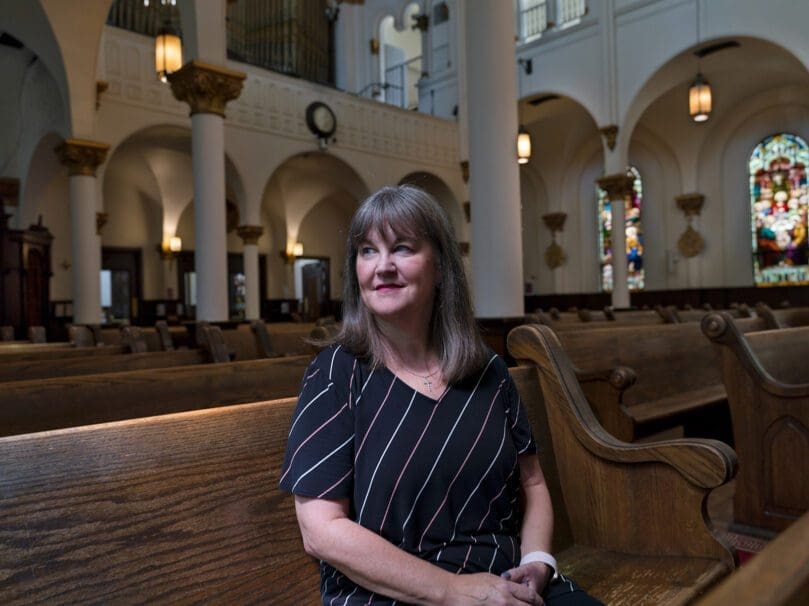 Photo by Johnathon Kelso
Photo by Johnathon KelsoAtlanta
Changing conversations around hot-button issues restores connections
By ANDREW NELSON, Staff Writer | Published September 15, 2022
ATLANTA–Kelly Schreckenberger found herself talking with a woman at church who favored abortion rights and opposed the Georgia “heartbeat” law, banning abortions after about six weeks of pregnancy.
Emotions got heated. The conversation was cut short.
“I didn’t say what I wanted to say. But I didn’t go deeper into the conversation. I didn’t think she was right, but then I thought, well, maybe she is, and what’s being lost here? I regretted saying nothing,” said Schreckenberger.
Schreckenberger, 56, a pastoral administrator at the Basilica of the Sacred Heart of Jesus, enrolled in a class called “Want to Talk? Communication Tools for Divided Times,” which encourages people to approach these hot-button conversations without demonizing people who have another point of view.
With intense national polarization, the Archdiocese of Atlanta Office of Life, Dignity and Justice began its outreach to help believers get better at talking and navigating across differences with family, friends and strangers. Even if you don’t agree, conversations can build trust, creating a broader connection.
Kat Doyle, director of Justice and Peace Ministries, said, “We need to be able to draw on tools in which to have productive conversations instead of divisive debates.”
David Campbell studies polarization as a political science professor at the University of Notre Dame.
People identifying as Republicans and Democrats “have begun to view each other with hostility and that’s a relatively new thing,” he said. Divisions are part of the country’s history and have been overcome, but this sustained animosity seems new, he said.
Researchers have found people are building ideological bubbles around their lives. People increasingly are sorting themselves into like-minded groups sharing politics, values and identity. A 2020 YouGov poll found 38 percent of both Democrats and Republicans reported they would feel “very upset” or “somewhat upset” about a child marrying a person from a different political party.
Technology has made sorting people by politics easier, he said. Our phones ping constantly with news updates. But that’s the opposite of what actually helps our society.
“Democracies work better actually, when people go about their lives” and politics is not a constant focus, he said.
Civic groups in which politics is not the sole purpose can play a part in helping heal the divide. Churches and ministries can serve as “bridging” institutions, drawing together people with shared values, but not necessarily the same political views. Sitting in the pews or working side by side in a ministry can knit people together in relationships, outside of those political conversations, he said.
Catholicism counters tribalism
David Key, 60, worships at the University of Georgia Catholic Center in Athens and is a faculty member at the Carl Vinson Institute of Government. He is learning these communication tools for professional reasons, in addition to his faith.
“Culture is pulling us into echo chambers. I think it’s part of the (Catholic) tradition to say that we’re going to fight against that kind of tribalism that is so evident these days,” said Key.
He admits he is not immune and has walked away from people when words and feelings get raw.
Those moments are sad, said Key, and “we should never get to a point we can’t continue to have conversations with people.”
Promoting civil dialogue is an effort led by Doyle. She recalled how before the 2016 election, parish meetings to inform church members about the U.S. Conference of Catholic Bishop’s “Faithful Citizenship” election principles broke down in to scoring political points. Every conversation turned into a debate someone wanted to win, instead of understanding a person’s point of view, she said.
A cornerstone of Catholic social teaching is upholding human dignity, even with those we may disagree with passionately, she said.
“Debate divides us and dialogue allows us to enter into more fulfilling relationships,” said Doyle.
About a dozen people in the Archdiocese of Atlanta, from clergy to parish leaders, have enrolled in the first class of the dialogue program.
“Want to Talk?” is a national initiative of the Just Faith Ministry. Since its launch in late 2021, several hundred people have been trained.
Executive Director Susie Tierney said people are not served in the current climate of distrust. “At the end of the day, when you had a conversation with somebody where you literally cannot hold the same space, nobody walks away from that feeling good,” she said.
During eight two-hour sessions, participants dive into practices highlighting empathy and compassion, along with best practices from the business world about truthful candor.
“I don’t think it’s too harsh to say that we have come to a point in our society in which we really struggle to be able to see the image of God in one another. The central question is how do we be like Jesus? And that we hold our ground and we stay true to the teachings of our faith,” said Director of Programs Kristin Dollar, who helped put presentation together.
Imitating Jesus with the ‘power of pause’
The class recently focused on the Gospel story told by St. Matthew and St. Mark of Jesus on his way to heal the daughter of a synagogue leader Jairus. While going toward the home of the sick girl, a woman with a hemorrhage touched him. Jesus stopped and spoke with her.
Schreckenberger has worked in church ministry for more than 20 years. For her, the lesson is how “he stopped what he was doing, and he took time to take care of her.”
One take-away lesson from the classes for her is “the power of pause, taking a breath, thinking about what do I really want?”
Schreckenberger’s goal is to take on candid conversations but strengthen her relationships at the same time.
“I can’t change another person’s behavior, but I can engage them into a conversation that would actually benefit us both,” she said.